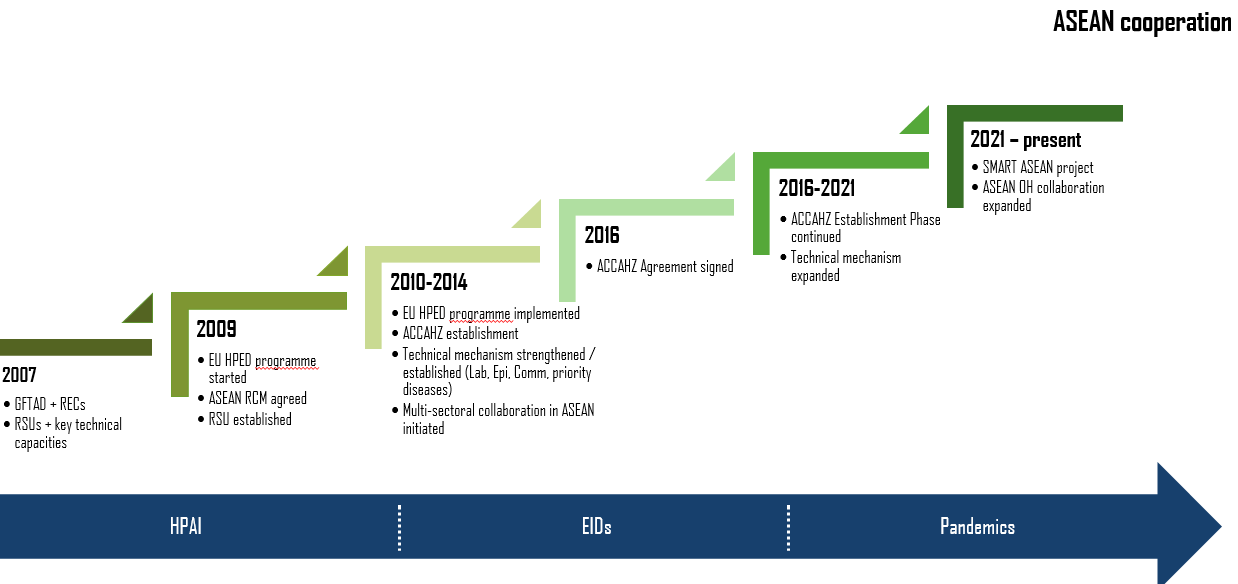Since its formalization in 1999-2000, the collaboration between FAO and Southeast Asian Nations (ASEAN) has been instrumental in advancing regional development, focusing on strengthening efforts in food security, agriculture, fisheries, forestry and sustainable development.
The 2013 Memorandum of Understanding, later renewed in 2018, underscores the shared commitment to enhancing cooperation in critical sectors such as agriculture and forestry. With a particular emphasis on transboundary animal disease control, food safety, nutrition, food security, and bioenergy development, these key areas highlight the collective dedication to promoting sustainable development across Southeast Asia.
In response to the evolving threats posed by transboundary, emerging, and re-emerging infectious diseases, including the global health threat of antimicrobial resistance (AMR), FAO and ASEAN have intensified their collaboration. Through ECTAD, this partnership operates at the regional level, addressing shared challenges and advancing mutual development goals. This synergy becomes even more significant in the face of global health crises, such as pandemics and the silent pandemic of AMR, which demands joint efforts at the regional level.

Milestones between FAO and ASEAN cooperation on animal health
A significant milestone was reached in 2010 during the 32nd ASEAN Ministers on Agriculture and Forestry (AMAF), marked by the unanimous endorsement of the AMAF Statement. This endorsement led to the establishment of the ASEAN Coordinating Centre for Animal Health and Zoonoses (ACCAHZ). ACCAHZ was conceived with a clear vision: to proactively address potential pandemics originating from animals through regional coordination for detecting, preventing, and controlling animal health threats and zoonoses.
Following the AMAF Statement, the ASEAN Sectoral Working Group on Livestock (ASWGL) established the Preparatory Committee for the Establishment of ACCAHZ and endorsed the creation of the ASEAN Regional Support Unit (RSU). Serving as a cornerstone in operationalizing ACCAHZ, the RSU played a pivotal role in supporting ASEAN in enhancing preparedness for animal diseases and related health threats.
The tangible outcomes of this collaboration are evident, with FAO actively supporting the establishment of ACCAHZ and complementary technical bodies such as the ASEAN Veterinary Epidemiology Group (AVEG), the ASEAN Laboratory Directors Forum (ALDF), and ASEAN Communication Group for Livestock (ACGL). This collaboration receives further momentum with the strengthened ASEAN RSU, supported by the Strengthening Mechanisms in Animal Health for a Resilient ASEAN (SMART ASEAN) project, funded by the Department of Foreign Affairs and Trade (DFAT) of the Australian Government.

ACCAHZ establishment
Facilitated the establishment of the ACCAHZ

Laboratory diagnosis strengthening
Strengthening ASEAN capacities in laboratory diagnosis

Strengthening epidemiology capacities in ASEAN
Strengthening epidemiology capacities in ASEAN
Highlights
---teaser.png?sfvrsn=84412282_1)
Video: ASEAN Coordinating Centre for Animal Health and Zoonoses (ACCAHZ) - teaser
ASEAN, with support from the FAO ECTAD in Asia and the Pacific and the Australian Government through the Department of Foreign Affairs and Trade (DFAT), has launched the ASEAN Coordinating Centre for Animal Health and Zoonoses (ACCAHZ) in 2024. The centre will facilitate cooperation among ASEAN Member States, speed up regional coordination for the prevention and control of zoonotic diseases and enable collaboration with public health and environment sectors to promote global health, food safety and food security.
Latest news
- ASEAN-Australia-FAO strengthening regional coordination to avert pandemics of animal origin
- Strengthening animal health cooperation in Southeast Asia: Malaysia takes a significant step towards the ASEAN Coordinating Centre for Animal Health and Zoonoses
- Southeast Asian countries strengthen regional animal health resilience through standardized evaluations supported by FAO and the Australian Government
- Indonesia Leads Bioinformatics Training for ASEAN Laboratory Personnel
